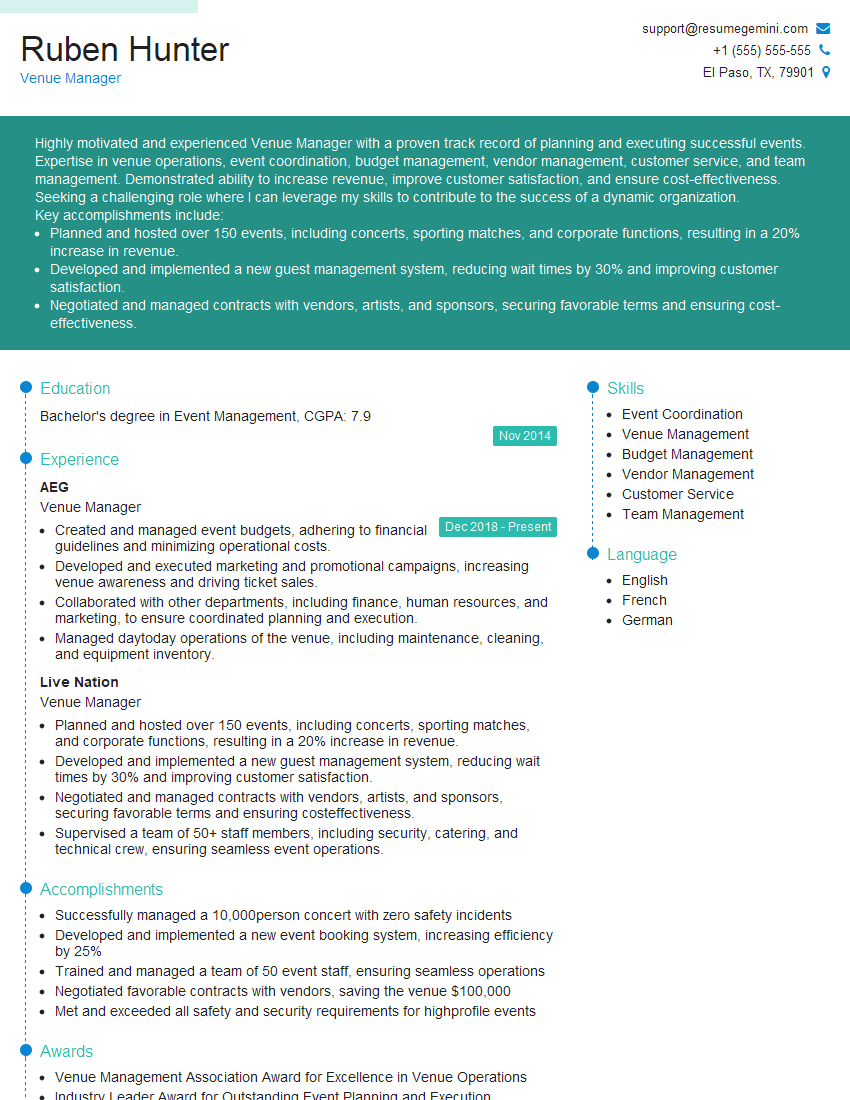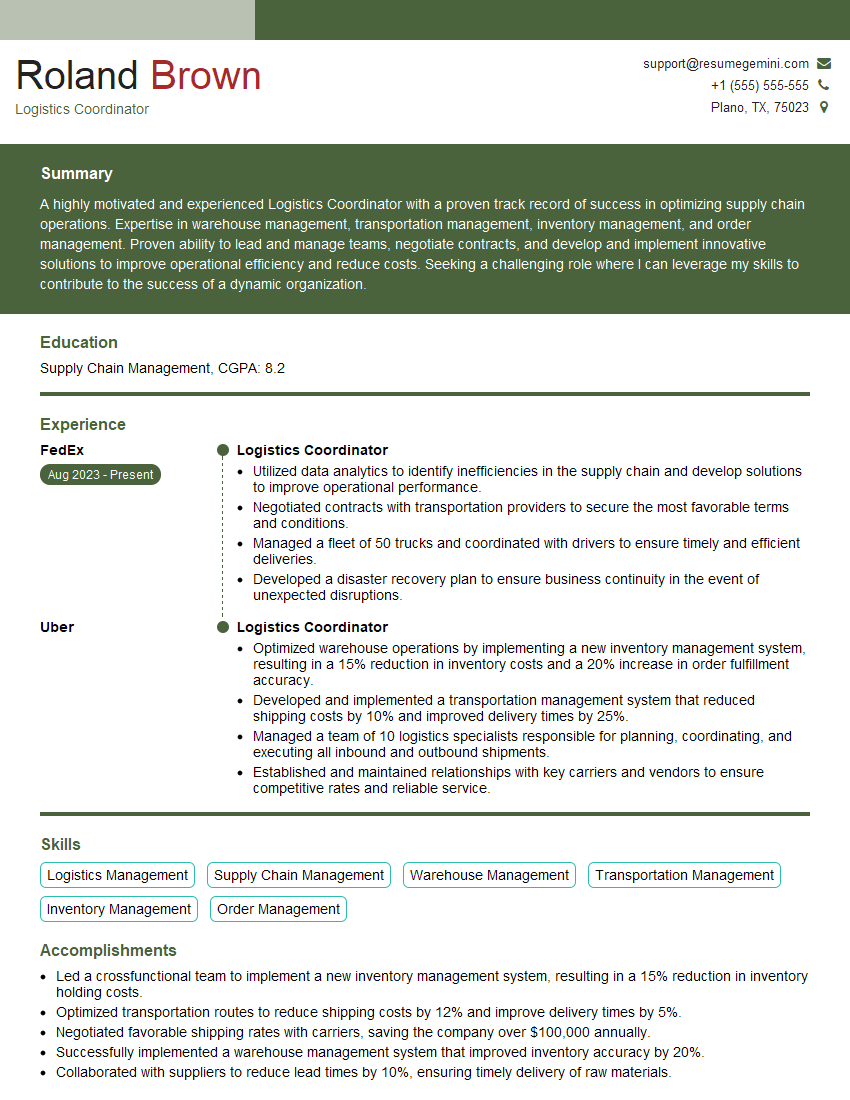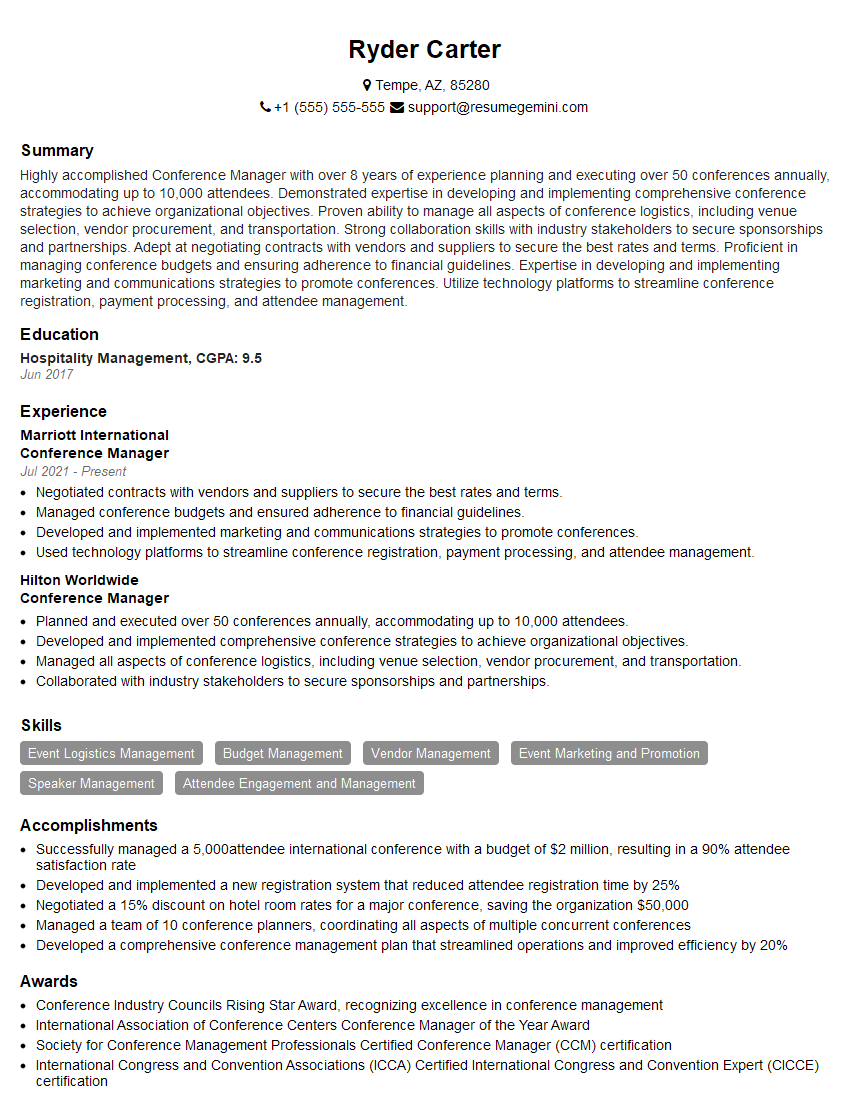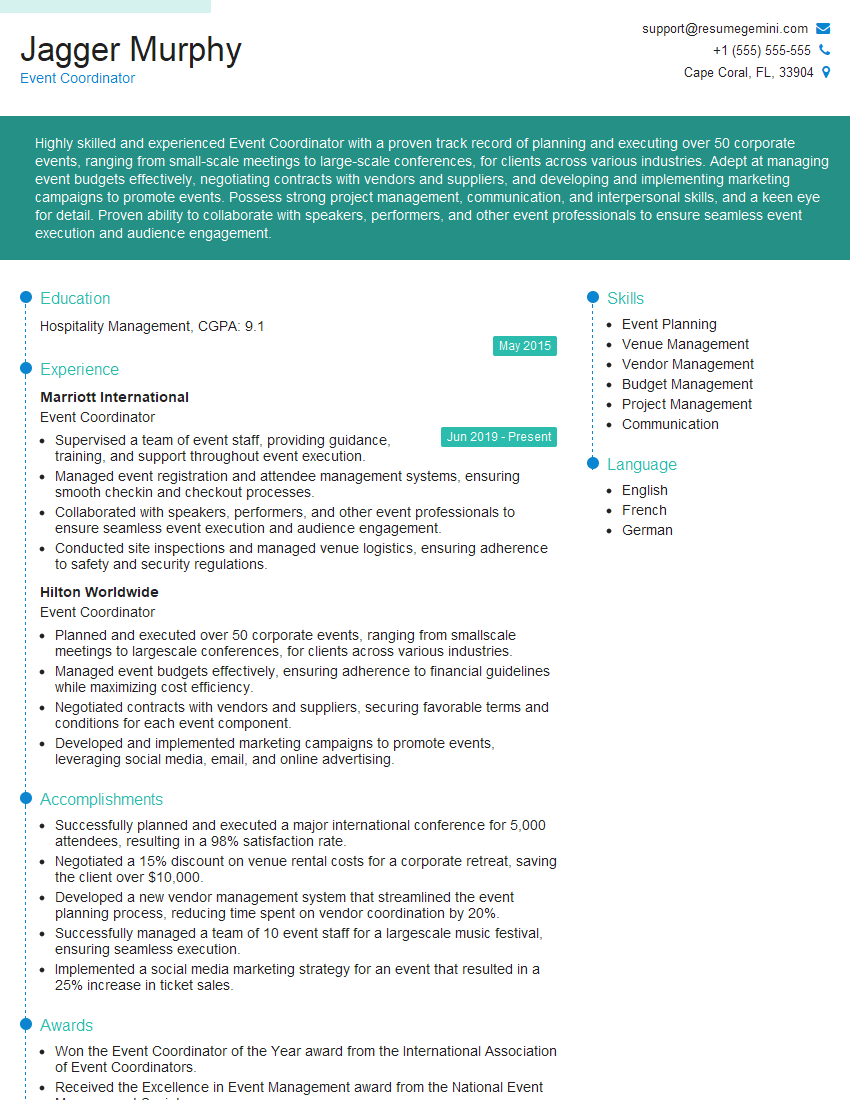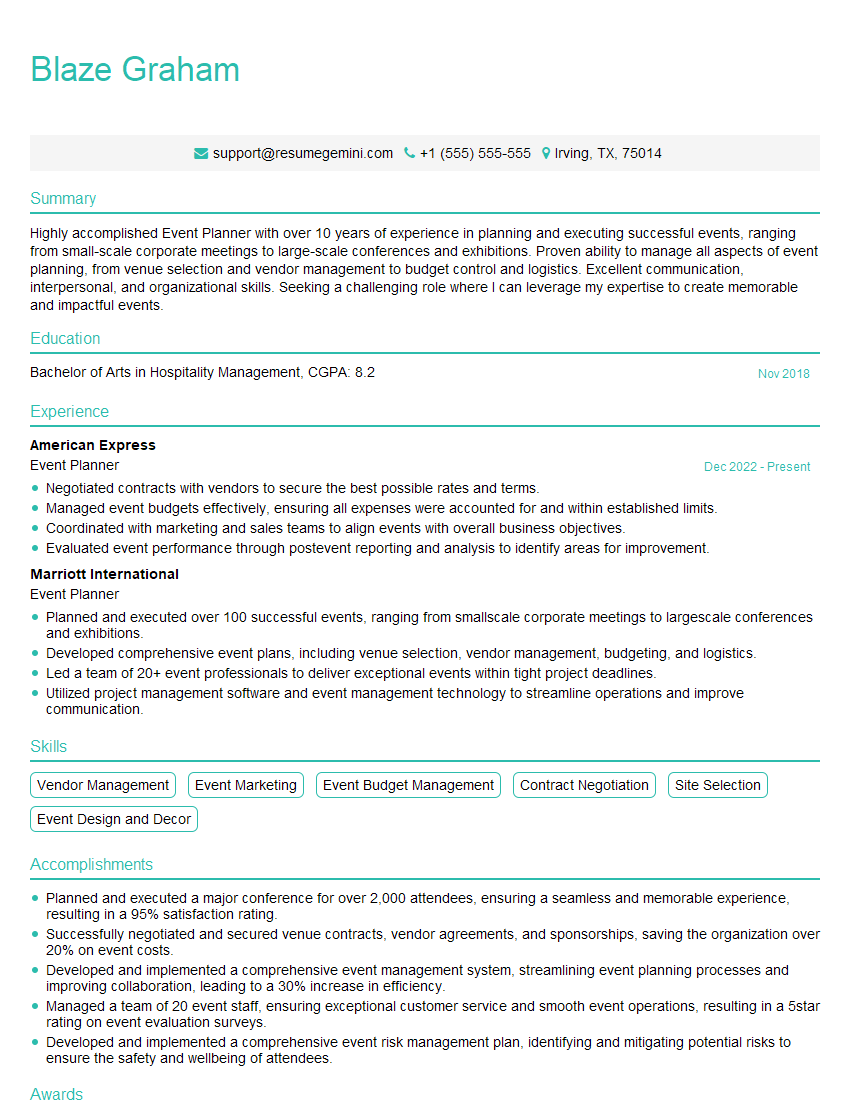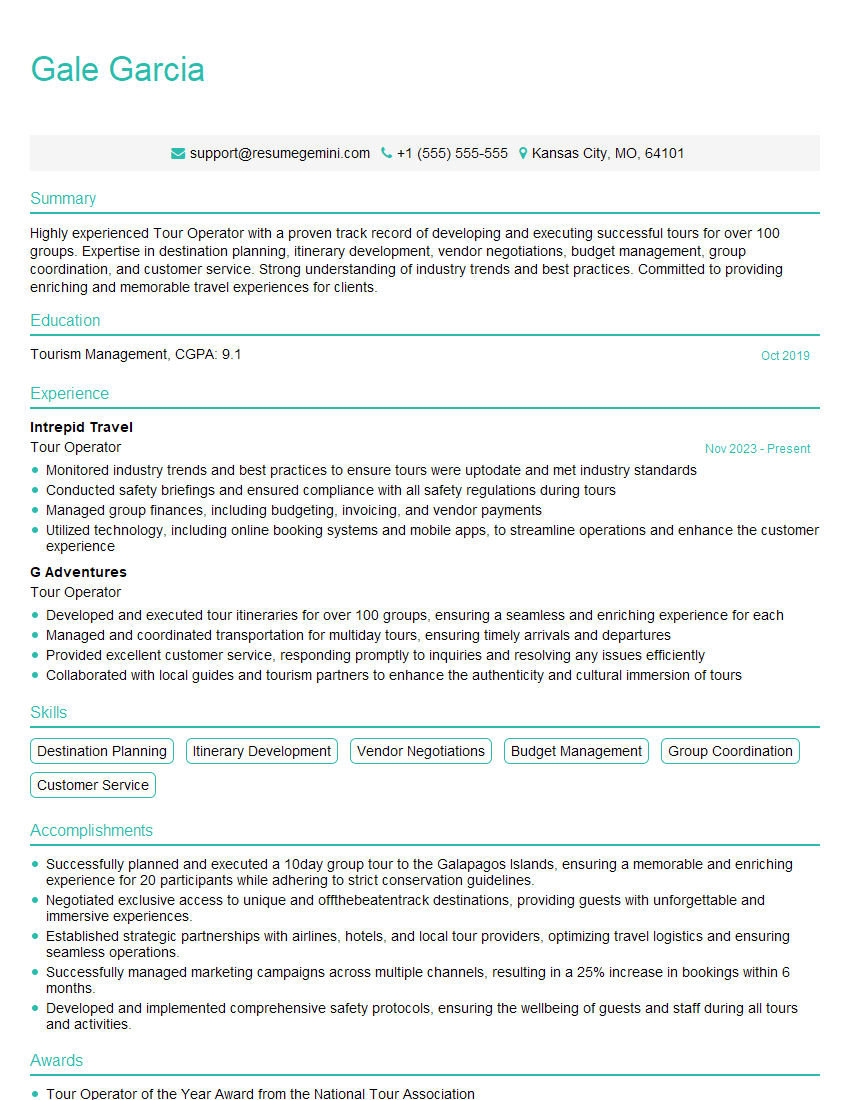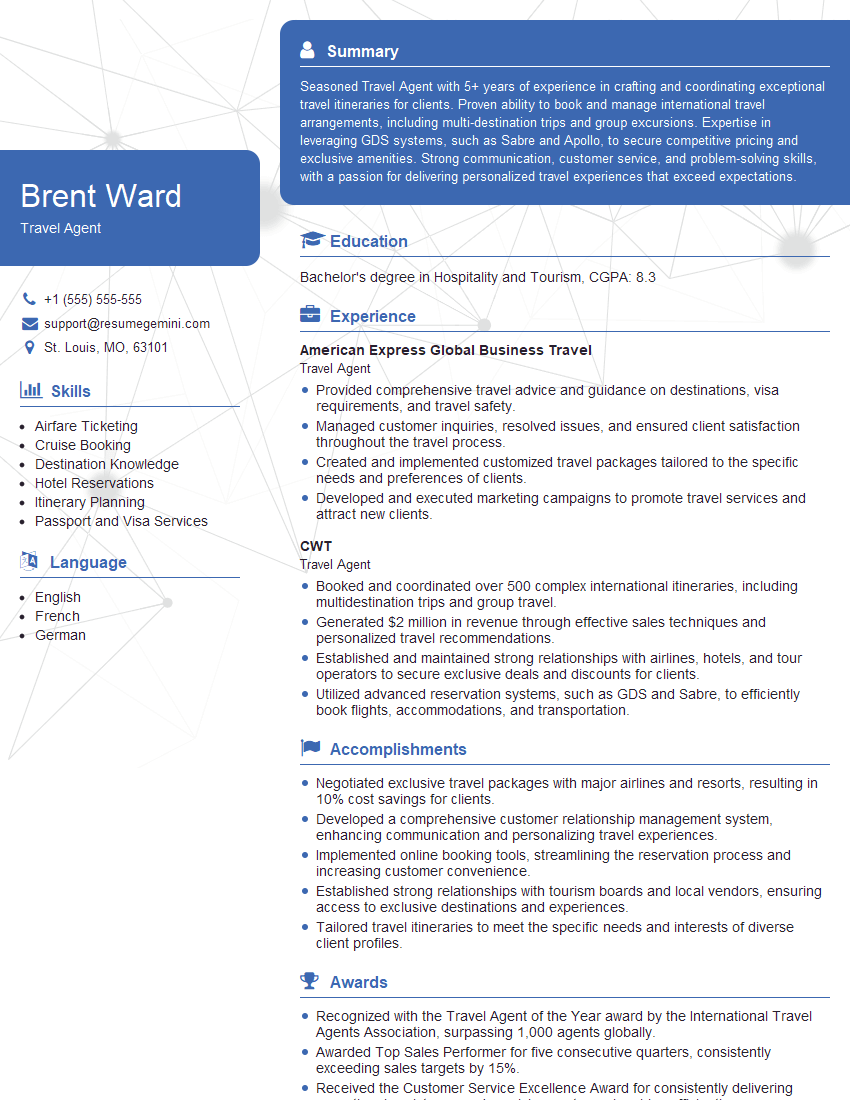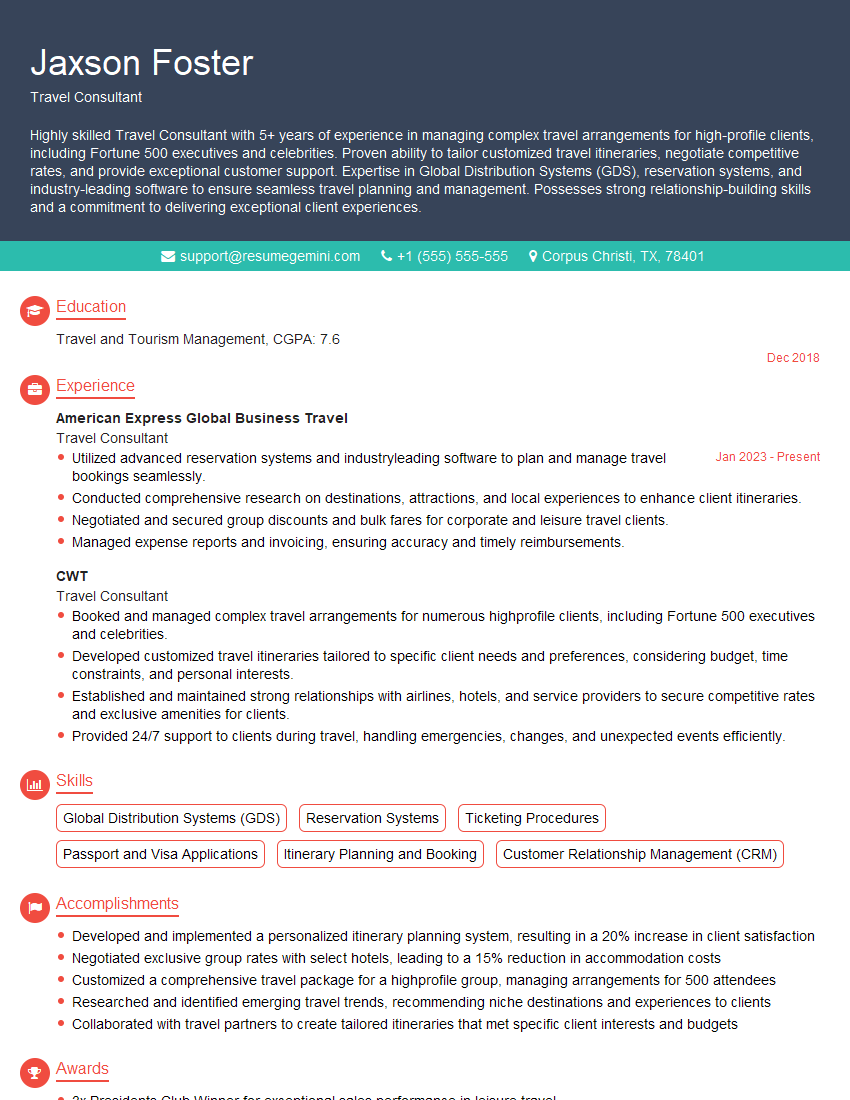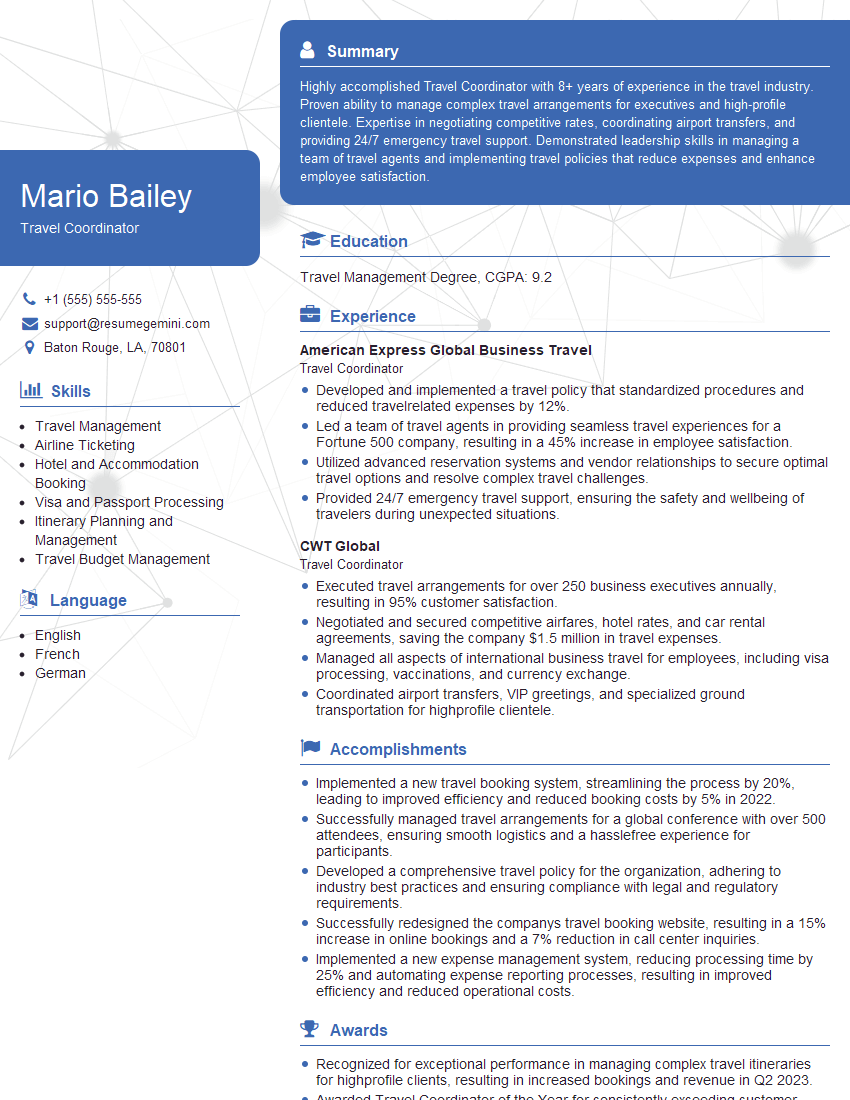Cracking a skill-specific interview, like one for Travel and Event Management, requires understanding the nuances of the role. In this blog, we present the questions you’re most likely to encounter, along with insights into how to answer them effectively. Let’s ensure you’re ready to make a strong impression.
Questions Asked in Travel and Event Management Interview
Q 1. Describe your experience in budget management for events.
Budget management for events is a crucial aspect of successful event planning. It involves meticulous planning, tracking, and controlling all expenses to ensure the event stays within its allocated budget. This process begins long before the event itself.
- Detailed Budgeting: I start by creating a comprehensive budget that outlines every anticipated cost. This includes venue rental, catering, marketing & advertising, speaker fees, technology, staffing, entertainment, transportation, permits and licenses, insurance, and contingency funds. I use spreadsheets and specialized event management software to categorize and track expenses.
- Negotiation & Cost Optimization: I actively negotiate with vendors to secure the best possible rates while ensuring quality doesn’t suffer. This involves researching competitive pricing, leveraging volume discounts, and exploring alternative options. For example, instead of a high-priced caterer, I might opt for a local restaurant offering comparable food quality at a more affordable rate.
- Real-time Monitoring & Reporting: Throughout the event planning process, I regularly monitor expenses against the budget. I use tracking tools to ensure we’re on track and flag any potential overspending early on. Regular reporting to stakeholders ensures transparency and accountability. I often present the budget in a clear and visually appealing manner (using charts and graphs) making it easy to understand the financial picture.
- Contingency Planning: I always build in a contingency fund (typically 10-15% of the total budget) to cover unexpected costs or unforeseen circumstances. This provides a safety net and prevents financial stress if things go awry.
For example, during a large conference I managed, we initially projected a catering cost of $20,000. Through careful vendor selection and menu negotiation, we reduced that to $17,500, saving $2,500 and demonstrating the impact of proactive budget management.
Q 2. How do you handle unexpected issues during an event?
Handling unexpected issues during an event requires a calm, decisive, and proactive approach. My strategy focuses on swift assessment, efficient communication, and problem-solving.
- Immediate Assessment: The first step is to quickly assess the severity and impact of the issue. Is it a minor inconvenience or a major disruption? This determines the urgency and resources required.
- Effective Communication: Clear and timely communication is key. I inform relevant stakeholders, including clients, vendors, and attendees, as appropriate. Transparency prevents misinformation and maintains confidence.
- Problem-Solving & Resource Allocation: I devise a solution, prioritizing efficiency and minimizing further disruption. This often involves resource allocation; for instance, if a speaker cancels unexpectedly, I have a backup plan in place. I may need to re-allocate budget or staff to address the problem.
- Documentation & Post-Event Analysis: After the event, I thoroughly document the unexpected issue, the response taken, and the lessons learned. This analysis helps refine future event planning and risk mitigation strategies.
For instance, during a gala dinner, a power outage occurred. My team and I immediately switched to backup generators, ensured candles and emergency lighting were deployed, and calmly reassured guests while the situation was resolved. The post-event analysis led to a stricter generator testing procedure.
Q 3. Explain your process for negotiating contracts with vendors.
Negotiating contracts with vendors is a critical skill. I aim for mutually beneficial agreements that protect my client’s interests while ensuring smooth vendor collaboration.
- Clear Requirements & Specifications: Before approaching vendors, I have clear requirements and specifications documented. This includes timelines, deliverables, payment terms, cancellation policies, and service levels.
- Vendor Research & Comparison: I research multiple vendors, comparing their offerings, pricing, and reputation. This allows for informed decision-making and strengthens my negotiation position.
- Collaborative Negotiation: I engage in collaborative negotiation, seeking win-win outcomes. I focus on building strong relationships based on mutual respect and trust. I clearly articulate my client’s needs and expectations while acknowledging the vendor’s constraints.
- Contract Review & Legal Counsel: I thoroughly review all contracts, ensuring they accurately reflect the agreed terms. When necessary, I consult with legal counsel to ensure the agreement is legally sound and protects my client’s interests.
For example, when negotiating catering contracts, I often focus on specific menu options, service staff levels and minimum guaranteed attendance numbers to ensure cost-effectiveness and high quality. This structured approach helps achieve favorable pricing.
Q 4. What software or tools do you use for event planning?
I utilize a variety of software and tools for event planning, depending on the project’s scale and complexity.
- Event Management Software: Platforms like Cvent, Social Tables, and Eventbrite help with registration, ticketing, marketing, and communication. These tools allow for streamlined processes, automated tasks, and improved collaboration.
- Project Management Software: Tools like Asana, Trello, or Monday.com are useful for task management, deadline tracking, and team collaboration. These platforms facilitate efficient planning and ensure that all tasks are completed on time.
- Spreadsheet Software: Microsoft Excel or Google Sheets are indispensable for budgeting, tracking expenses, and managing RSVPs. These are highly versatile tools useful for data analysis and reporting.
- Communication & Collaboration Tools: Platforms like Slack, Microsoft Teams, or email facilitate clear communication between the event team, vendors, and stakeholders.
Choosing the right tools depends on the event. For smaller events, simpler tools might suffice, while larger, more complex events would benefit from integrated event management systems.
Q 5. How do you manage risk in travel and event planning?
Risk management in travel and event planning is crucial to minimize potential disruptions and ensure a successful event. My approach involves proactive identification, assessment, and mitigation of risks.
- Risk Identification: I identify potential risks throughout the planning process. This includes factors such as weather conditions, security threats, venue availability, logistical challenges (transportation, accommodation), health concerns, and potential cancellations. I conduct a thorough risk assessment using SWOT (Strengths, Weaknesses, Opportunities, Threats) analysis.
- Risk Assessment: I assess the likelihood and potential impact of each identified risk. This helps prioritize which risks require immediate attention and what mitigation strategies are necessary.
- Risk Mitigation: I develop strategies to minimize or eliminate identified risks. This may involve purchasing insurance, developing contingency plans (backup venues, speakers, transportation), establishing clear communication protocols, and pre-booking key resources.
- Contingency Planning: I create detailed contingency plans for high-impact events or high-risk scenarios. This is crucial for ensuring swift and effective responses should unforeseen circumstances arise. For instance, if there’s a threat of a hurricane, we might have a backup plan in a different location.
For example, when planning an international event, I carefully analyze political stability, travel advisories, and potential health risks in the destination country. Based on this assessment, I’ll implement appropriate preventative measures.
Q 6. Describe your experience with international travel logistics.
My experience with international travel logistics encompasses all aspects of planning and executing events across borders. It requires meticulous attention to detail and a thorough understanding of international regulations and customs.
- Visa & Passport Requirements: I ensure all attendees and speakers have the necessary travel documents, including visas and passports, well in advance of travel. This often involves assisting with visa applications and navigating complex immigration procedures.
- International Flights & Transportation: I book and manage international flights, considering cost-effectiveness, flight schedules, and connecting flights. I also arrange ground transportation at the destination, including airport transfers, shuttle services, and local transportation.
- Accommodation & Logistics: I secure suitable accommodation for attendees and speakers, taking into account their preferences and budgetary constraints. This includes booking hotels, arranging airport transfers, and coordinating other aspects of their stay.
- Currency Exchange & Budgeting: I factor in international currency exchange rates when developing the budget and manage expenses accordingly. This includes considering potential fluctuations in currency values.
- Cultural Sensitivity & Local Regulations: I am aware of cultural nuances and local regulations in the destination country and make appropriate arrangements accordingly. This ensures that the event is culturally sensitive and compliant with all relevant laws.
For example, when organizing a conference in Japan, I coordinated visas, arranged high-speed rail passes for attendees, and ensured the event respected Japanese customs and etiquette, showcasing cultural sensitivity.
Q 7. How do you prioritize tasks during a high-pressure event?
Prioritizing tasks during a high-pressure event requires a structured approach and strong organizational skills. My method combines urgency, importance, and resource availability.
- Urgency & Importance Matrix: I utilize an urgency/importance matrix (Eisenhower Matrix) to categorize tasks based on urgency (how soon it needs to be done) and importance (impact on the event’s success). This helps focus efforts on critical tasks first.
- Delegation & Teamwork: I effectively delegate tasks to team members based on their skills and availability. Clear communication and responsibility assignment are crucial for efficient teamwork.
- Time Management Techniques: I use time management techniques like time blocking, the Pomodoro Technique, or prioritizing tasks based on the Pareto Principle (80/20 rule) to optimize time and productivity.
- Flexibility & Adaptability: I remain adaptable and flexible, readily adjusting priorities as unforeseen circumstances arise. This requires proactive monitoring and a willingness to adjust the plan as needed.
For example, if a critical speaker arrives late, I’ll re-prioritize my tasks to ensure a smooth program flow, while simultaneously communicating with the audience and other stakeholders.
Q 8. Explain your understanding of event marketing and promotion.
Event marketing and promotion is the strategic process of creating awareness, generating interest, and driving attendance for an event. It involves a multi-faceted approach, encompassing various marketing channels and tactics to reach the target audience effectively.
Think of it like building anticipation for a highly anticipated movie release – you use trailers, posters, social media campaigns, and potentially influencer marketing to create a buzz. Similarly, event marketing uses a mix of strategies. This includes:
- Digital Marketing: Utilizing social media platforms (Facebook, Instagram, Twitter, LinkedIn), email marketing campaigns, paid advertising (Google Ads, social media ads), and search engine optimization (SEO) to enhance online visibility and drive registrations.
- Public Relations (PR): Securing media coverage through press releases, media kits, and influencer outreach to expand reach and build credibility.
- Content Marketing: Creating valuable and engaging content such as blog posts, articles, videos, and infographics related to the event to attract and educate potential attendees.
- Traditional Marketing: Employing print advertising (flyers, brochures, newspaper ads), direct mail marketing, and partnerships with relevant organizations to reach a broader audience.
- Experiential Marketing: Creating memorable experiences for attendees and prospective attendees to foster a connection and build loyalty. This could involve interactive booths, giveaways, and other engagement opportunities.
For instance, I once managed a large-scale technology conference. We successfully employed a multi-channel marketing strategy involving targeted social media advertising, collaborations with industry influencers, and a robust email marketing campaign segmented by attendee profiles. This resulted in a 30% increase in attendance compared to the previous year.
Q 9. How do you ensure the safety and security of attendees at an event?
Ensuring attendee safety and security is paramount. It’s not just about avoiding incidents; it’s about creating a secure and welcoming environment that allows attendees to fully enjoy the event. This requires a comprehensive, proactive approach that begins long before the event date.
- Risk Assessment: A thorough risk assessment identifies potential threats (e.g., overcrowding, security breaches, medical emergencies) and outlines mitigation strategies.
- Security Personnel: Employing trained security personnel to monitor entrances, exits, and event spaces, managing crowd control, and responding to incidents.
- Emergency Preparedness: Developing and rehearsing comprehensive emergency plans, including procedures for evacuations, medical emergencies, and security breaches. This often involves working closely with local emergency services.
- Venue Security: Collaborating with the venue to ensure adequate security measures are in place, such as surveillance cameras, secure access points, and emergency exits.
- Communication Plan: Establishing clear communication channels with attendees, staff, and emergency services to facilitate rapid response and information dissemination during incidents.
- Attendee Information: Collecting attendee information for contact tracing and emergency response – ensuring adherence to data privacy regulations is crucial.
For example, at a music festival I coordinated, we implemented a robust security plan that included metal detectors, bag checks, and clearly marked emergency exits. We also partnered with local police and paramedics to ensure a swift response to any potential issues. Regular communication updates were sent to attendees throughout the festival via SMS, email, and social media.
Q 10. Describe your experience with event registration and ticketing.
Event registration and ticketing is the backbone of any successful event. It’s the process of managing attendee registrations, issuing tickets, and collecting relevant information. Efficient management is critical for smooth event operations and accurate data analysis.
My experience encompasses a range of ticketing platforms and registration methods. I’ve utilized:
- Online Registration Platforms: Eventbrite, Cvent, and other platforms offer streamlined registration processes, automated email confirmations, and detailed reporting capabilities. I’ve customized these platforms to match specific event needs, including multiple ticket types and tiered pricing.
- Manual Registration: While less efficient for large events, manual registration can be necessary for specific situations, often requiring careful tracking and data entry.
- Ticket Sales & Distribution: Experience with both online ticket sales (e.g., through ticketing platforms) and physical ticket distribution at various points of sale.
- Data Management: Proficient in managing registrant data, ensuring accuracy, and adhering to data privacy regulations (e.g., GDPR, CCPA).
In a recent corporate retreat I managed, we used Cvent to handle registration. The platform’s automated email system significantly reduced manual workload. We also used its reporting features to gain valuable insights into attendee demographics and preferences, which helped us refine future events.
Q 11. How do you measure the success of an event?
Measuring event success goes beyond simply counting attendees. It involves assessing various factors against pre-defined objectives. A multi-faceted approach is essential to gain a comprehensive understanding of performance.
- Attendance & Registration Rates: Measuring the number of attendees against target numbers helps to assess the effectiveness of marketing efforts.
- Feedback & Surveys: Post-event surveys, feedback forms, and social media monitoring provide valuable insights into attendee satisfaction and areas for improvement.
- Financial Metrics: Analyzing revenue, costs, and profit margins assesses the event’s financial viability.
- Sponsor Satisfaction: Evaluating sponsor engagement and return on investment (ROI) is vital for securing future sponsorships.
- Social Media Engagement: Tracking social media mentions, shares, and reach provides insights into the event’s online impact.
- Achieving Event Goals: Did the event meet its primary objectives? (e.g., raising awareness, generating leads, promoting a product). This requires clear goal setting beforehand.
For example, at a charity gala I organized, success was measured not only by attendance but also by the amount of money raised for the cause. We tracked donations throughout the event and compared the results to previous years. Post-event surveys helped us gauge attendee satisfaction and identify areas for improvement in future galas.
Q 12. What is your experience with sustainability in event planning?
Sustainability is increasingly crucial in event planning. It involves minimizing the environmental impact of events while maximizing positive social and economic impacts. My experience includes implementing various sustainable practices.
- Waste Reduction: Implementing strategies to minimize waste, such as using reusable materials, providing recycling bins, and sourcing locally-sourced food and beverages.
- Carbon Footprint Reduction: Offsetting carbon emissions through carbon offsetting programs or choosing sustainable transportation options for attendees and staff.
- Energy Efficiency: Using energy-efficient lighting, AV equipment, and venue selection to minimize energy consumption.
- Sustainable Sourcing: Choosing suppliers who prioritize sustainability in their practices (e.g., locally-sourced catering, recycled materials for promotional items).
- Water Conservation: Implementing water-saving practices in the venue and during event operations.
In a recent conference, we minimized our environmental impact by using digital materials instead of printed ones, provided reusable water bottles, and partnered with a local caterer focused on sustainable food sourcing. We also encouraged attendees to use public transport through subsidized tickets and clear directions to the venue.
Q 13. How do you build and maintain relationships with clients?
Building and maintaining strong client relationships is fundamental to success in event management. It’s about understanding their needs, exceeding their expectations, and fostering trust and open communication.
- Active Listening: Truly understanding the client’s vision, goals, and expectations for the event. This involves asking clarifying questions and actively listening to their responses.
- Regular Communication: Maintaining consistent and transparent communication throughout the planning process, providing regular updates and addressing concerns promptly.
- Building Trust: Demonstrating professionalism, expertise, and reliability. Following through on commitments and managing expectations effectively.
- Proactive Problem-Solving: Anticipating potential problems and offering solutions proactively, rather than reactively.
- Post-Event Follow-Up: Sending thank-you notes, sharing event feedback and reports, and discussing future collaboration possibilities.
I always aim to build a partnership with my clients. For example, I take the time to understand their business goals and how the event aligns with these. This collaborative approach ensures I deliver an event that exceeds their expectations and creates value for their organization.
Q 14. How do you handle difficult or demanding clients?
Handling difficult or demanding clients requires patience, diplomacy, and strong communication skills. The key is to remain professional and focus on finding solutions.
- Empathy & Understanding: Attempting to understand the client’s perspective and the reasons behind their demands or concerns.
- Active Listening & Clarification: Clearly listening to their concerns and asking clarifying questions to ensure a full understanding of the issues.
- Problem-Solving & Collaboration: Working collaboratively with the client to find mutually acceptable solutions. Presenting options and explaining the rationale behind recommendations.
- Setting Boundaries & Managing Expectations: Clearly communicating expectations, limitations, and the scope of services provided.
- Escalation Procedures: Having a clear escalation plan in place for issues that cannot be resolved at a lower level.
I once had a client who was incredibly demanding and changed their mind frequently. By remaining calm, actively listening to their concerns, and presenting options within budget and timeline constraints, I was able to successfully navigate the situation and deliver a successful event that ultimately met their satisfaction.
Q 15. Describe your experience with post-event analysis and reporting.
Post-event analysis is crucial for evaluating the success of an event and informing future planning. It involves a systematic review of all aspects, from attendance and budget to attendee feedback and sponsor satisfaction. My approach involves a multi-stage process.
- Data Collection: This includes gathering quantitative data like registration numbers, attendance figures, and financial reports, as well as qualitative data through surveys, feedback forms, and social media sentiment analysis.
- Analysis: I use data visualization tools and analytical techniques to identify trends, successes, and areas for improvement. For example, comparing pre-event expectations with actual results helps assess the accuracy of forecasting.
- Reporting: I create comprehensive reports that clearly present the findings, including key performance indicators (KPIs) such as return on investment (ROI) and customer satisfaction scores. These reports are tailored to the specific stakeholders, highlighting information relevant to their interests.
- Action Planning: Finally, the analysis informs actionable strategies for future events. For instance, if attendee feedback reveals dissatisfaction with the catering, we can explore different vendors or catering options for the next event.
For example, in a recent conference, post-event analysis revealed a high level of satisfaction with the speakers but a lower-than-expected turnout for the networking event. This led us to revise the networking event format and timing for future conferences.
Career Expert Tips:
- Ace those interviews! Prepare effectively by reviewing the Top 50 Most Common Interview Questions on ResumeGemini.
- Navigate your job search with confidence! Explore a wide range of Career Tips on ResumeGemini. Learn about common challenges and recommendations to overcome them.
- Craft the perfect resume! Master the Art of Resume Writing with ResumeGemini’s guide. Showcase your unique qualifications and achievements effectively.
- Don’t miss out on holiday savings! Build your dream resume with ResumeGemini’s ATS optimized templates.
Q 16. What is your preferred method for communication with stakeholders?
Effective communication with stakeholders is paramount in event management. My preferred method involves a multi-channel approach, tailored to the specific needs and preferences of each stakeholder group.
- Regular Project Updates: I utilize project management software like Asana or Monday.com to provide regular updates on progress, milestones, and potential challenges.
- Targeted Emails: Specific concerns or updates are communicated via targeted emails, ensuring the right information reaches the right people.
- Face-to-Face Meetings: For key stakeholders or critical decisions, face-to-face meetings are invaluable for fostering collaboration and building rapport. These meetings can be in-person or virtual.
- Dedicated Communication Channels: A dedicated project communication channel (e.g., a shared online platform or group chat) facilitates quick question-and-answer sessions and quick problem-solving.
I always maintain transparency and ensure prompt responses to queries, building trust and confidence among stakeholders.
Q 17. How do you manage time effectively during event planning?
Effective time management is critical in event planning, a highly demanding field with numerous moving parts. My approach involves a combination of strategic planning and diligent execution.
- Detailed Project Timeline: I create a detailed project timeline outlining all tasks, deadlines, and dependencies. This allows for efficient task prioritization and resource allocation.
- Prioritization Matrix: I employ a prioritization matrix (e.g., Eisenhower Matrix) to categorize tasks based on urgency and importance, focusing on high-impact activities first.
- Time Blocking: I allocate specific time blocks for different tasks throughout the day to maintain focus and avoid multitasking. This structured approach enhances productivity.
- Regular Check-ins: Regular check-ins with the team help to identify potential bottlenecks and adjust the timeline accordingly. Flexibility is key.
For example, I recently managed a large-scale conference with a tight deadline. Using a Gantt chart and prioritizing critical tasks like securing the venue and securing key speakers allowed me to stay on schedule despite several unexpected challenges.
Q 18. Describe your experience with vendor management.
Vendor management is a significant aspect of event planning. It involves selecting, contracting, and managing various vendors to ensure seamless event execution. My experience includes:
- Vendor Selection: I meticulously research and vet potential vendors, considering factors such as reputation, experience, pricing, and capabilities. References are essential.
- Contract Negotiation: I carefully negotiate contracts, ensuring clarity on scope of work, payment terms, and liability clauses. This minimizes potential disputes.
- Communication and Collaboration: Throughout the event planning process, I maintain clear and consistent communication with vendors, addressing any concerns or issues promptly. Regular check-ins and progress reports help keep the project on track.
- Performance Monitoring: I actively monitor vendor performance throughout the event, ensuring they meet contractual obligations and deliver high-quality services.
For instance, in a recent event, proactive communication with our catering vendor helped avert a potential crisis when their initial supply chain encountered problems. We found an alternative, ensuring no disruption to the event.
Q 19. How do you handle conflicting priorities during event planning?
Conflicting priorities are inevitable in event planning. Addressing them effectively requires a structured approach:
- Prioritization and Delegation: I carefully prioritize tasks based on their impact and urgency, delegating less critical tasks where possible.
- Open Communication: I foster open communication with stakeholders to clarify expectations and negotiate compromises when necessary. Transparency is essential.
- Resource Allocation: I strategically allocate resources (time, budget, personnel) to the most critical tasks, ensuring the most important objectives are met first.
- Contingency Planning: I develop contingency plans to address potential disruptions or conflicts. This preparedness minimizes the impact of unforeseen events.
For example, if a speaker cancels unexpectedly, having a backup speaker identified and prepared ahead of time minimizes disruption. Open communication with attendees keeps everyone informed and reduces anxieties.
Q 20. Explain your experience with different event formats (e.g., conferences, webinars, hybrid events).
I have extensive experience managing various event formats, each requiring a unique approach:
- Conferences: These require meticulous planning for logistics, speaker coordination, marketing, and attendee engagement. I focus on creating a compelling agenda and maximizing networking opportunities.
- Webinars: These demand technical expertise in online platforms, engaging content delivery, and interactive features. I prioritize audience engagement through polls, Q&A sessions, and interactive elements.
- Hybrid Events: These combine in-person and virtual elements, necessitating a seamless integration of both. This includes managing both physical and virtual logistics, ensuring consistent experiences for both attendees.
The key is adapting strategies to each format while maintaining a focus on attendee experience and event objectives. Each event type presents its unique challenges and opportunities.
Q 21. How do you stay updated on industry trends in travel and event management?
Staying current with industry trends is vital for success in travel and event management. I employ several strategies:
- Industry Publications and Websites: I regularly read industry publications, blogs, and websites to keep abreast of emerging technologies, best practices, and market trends.
- Professional Networking: I actively participate in industry conferences, workshops, and networking events to learn from peers and experts.
- Professional Development Courses: I regularly pursue professional development courses and certifications to update my knowledge and skills.
- Social Media and Online Communities: I engage with relevant social media groups and online communities to stay informed about emerging trends and discussions.
Continuous learning is paramount in this dynamic field, ensuring my expertise remains relevant and my approaches are always cutting-edge.
Q 22. Describe your experience in creating and managing event schedules.
Creating and managing event schedules is the backbone of successful event planning. It involves meticulous planning, resource allocation, and seamless coordination. My approach begins with a comprehensive understanding of the event’s objectives, target audience, and desired outcomes. I then break down the event into smaller, manageable tasks with clearly defined timelines.
For example, for a multi-day conference, I might create a master schedule outlining key sessions, speaker presentations, networking events, and breaks. This master schedule then gets further broken down into detailed daily agendas, specifying room assignments, speaker briefing times, technical setup requirements, and catering arrangements. I utilize project management software like Asana or Monday.com to track progress, assign tasks to team members, and manage dependencies. Critical path analysis is employed to identify tasks that are crucial to the overall timeline and require careful monitoring. Regular progress meetings ensure everyone remains aligned and any potential delays are addressed proactively.
Furthermore, I’m adept at building in buffer time to account for unforeseen circumstances, like technical difficulties or speaker cancellations. This proactive approach minimizes stress and maximizes the likelihood of a smoothly run event. I always maintain multiple versions of the schedule, accommodating potential changes and providing stakeholders with the most up-to-date information.
Q 23. How do you choose appropriate venues for events?
Selecting the right venue is paramount; it sets the tone and can significantly impact attendee experience and event success. My venue selection process is multifaceted and involves careful consideration of several key factors. First, I assess the event’s size and type. A small workshop requires a different venue than a large-scale conference.
Next, I evaluate the venue’s capacity, layout, and amenities. Does it offer sufficient space for attendees, breakout sessions, catering, and registration? Are there adequate audio-visual capabilities, accessibility features, and sufficient parking? Location is crucial, considering proximity to transportation, hotels, and local attractions. The venue’s overall aesthetic also plays a role, ensuring it aligns with the event’s branding and desired atmosphere. I always visit potential venues in person to assess their suitability firsthand.
For instance, when planning a corporate retreat, I might prioritize a venue with on-site recreational activities to promote team building. For a tech conference, proximity to public transportation and sufficient Wi-Fi would be paramount. I also consider budget constraints and negotiate contracts to secure the best possible rates and terms. Reviews and testimonials from past clients are also carefully evaluated to understand the venue’s reputation for service and professionalism.
Q 24. What is your experience with event technology and its applications?
Event technology is no longer a luxury, but a necessity for efficient and engaging event experiences. My experience encompasses a wide range of technologies, from registration and ticketing platforms (e.g., Eventbrite, Cvent) to virtual event platforms (e.g., Zoom, Hopin) and audience engagement tools (e.g., Slido, Kahoot!).
I’m proficient in utilizing event management software to streamline various aspects of event planning, including attendee registration, communication, budgeting, and reporting. For example, I’ve used Cvent to manage attendee lists, track RSVPs, and generate customized reports. For virtual events, I’ve integrated live streaming platforms with interactive features to enhance attendee engagement. I’m also skilled in using CRM systems to manage pre- and post-event communication with attendees and stakeholders.
Moreover, I understand the importance of data analytics and leverage event technology to collect and analyze attendee data to gain insights into event effectiveness and inform future planning decisions. I am comfortable troubleshooting technical issues and ensuring a seamless technological experience for both attendees and staff.
Q 25. How do you ensure accessibility at your events?
Ensuring accessibility at events is not just a legal requirement, but a moral imperative. My approach to accessibility is proactive and comprehensive, starting with the initial planning stages. This means carefully considering the needs of attendees with disabilities throughout the entire event lifecycle.
I begin by consulting accessibility guidelines and best practices, including the Americans with Disabilities Act (ADA) standards. I work closely with venue managers to ensure the chosen location is fully accessible, including ramps, elevators, accessible restrooms, and designated seating areas. I also ensure clear signage and wayfinding throughout the venue. For online events, I incorporate features such as closed captioning, audio description, and screen reader compatibility.
Furthermore, I provide clear and accessible communication materials, including event brochures and website content in alternative formats (e.g., large print, Braille). I actively solicit feedback from attendees with disabilities to continually improve accessibility measures and ensure a welcoming and inclusive environment for everyone. This might involve arranging for sign language interpreters, providing assistive listening devices, or offering accessible transportation options. Prioritizing accessibility creates an inclusive event that respects and celebrates the diversity of its attendees.
Q 26. Describe your approach to creating detailed event budgets.
Creating detailed event budgets is crucial for effective financial management. My approach involves a systematic breakdown of all anticipated expenses and income sources. I start with a clear definition of the event’s scope and objectives, as this directly impacts the budget.
I then create a detailed list of all potential expenses, categorized into different areas such as venue rental, catering, marketing, entertainment, technology, staffing, and contingency funds. Each expense item is carefully estimated based on market rates, vendor quotes, and past experience. I use spreadsheet software to track expenses, allowing for easy updates and analysis. I also incorporate contingency funds to accommodate unforeseen circumstances.
On the income side, I identify potential revenue streams, such as ticket sales, sponsorships, and advertising. I project revenue based on realistic attendance estimates and sponsorship packages. I continuously monitor the budget throughout the planning process, comparing actual expenses against projected costs. Regular budget reviews ensure that any variances are identified and addressed promptly, preventing overspending and maximizing cost efficiency. The final budget is always presented clearly to stakeholders, showing a breakdown of expenses and anticipated revenue.
Q 27. How do you handle potential travel disruptions?
Travel disruptions are an unavoidable reality in event management, and proactive planning is essential to mitigate their impact. My approach involves a layered strategy starting with thorough pre-event risk assessment. I identify potential disruptions like flight cancellations, weather events, or geopolitical instability.
Next, I develop contingency plans for each identified risk. This might involve securing alternative transportation options, booking flexible flight tickets, or having backup venues in different locations. I provide attendees with clear communication channels and regularly update them on any potential disruptions.
For instance, if a major storm is predicted, I might advise attendees to arrive a day early or offer virtual participation options. I also maintain contact with all vendors and suppliers to ensure they have contingency plans in place. Throughout the event, I monitor weather updates and news reports, ready to implement contingency plans as needed. A strong communication strategy minimizes attendee anxiety and keeps everyone informed. A well-defined escalation process ensures prompt resolution of any unforeseen issues.
Q 28. What is your experience in selecting appropriate transportation for events?
Selecting appropriate transportation for events requires careful consideration of several factors, including the number of attendees, event location, budget, and attendee needs. My approach focuses on providing safe, efficient, and cost-effective transportation options.
For large events, I might arrange for chartered buses or shuttle services to transport attendees from airports or hotels to the event venue. I carefully vet transportation providers, checking their safety records, insurance coverage, and licensing. For smaller events, I might recommend ride-sharing services or public transportation options, providing clear instructions and recommendations to attendees.
Accessibility is always a primary concern; I ensure that transportation options are accessible to attendees with disabilities. This may involve arranging for wheelchair-accessible vehicles or coordinating with specialized transportation services. I always obtain multiple quotes from different transportation providers to compare prices and services, ensuring cost-effectiveness. Pre-event communication to attendees with clear instructions on transportation arrangements is crucial for a smooth event experience. I meticulously plan routes and timings to minimize delays and optimize efficiency.
Key Topics to Learn for Travel and Event Management Interview
- Destination Management: Understanding the nuances of various destinations, including visa requirements, local customs, and potential challenges.
- Event Planning & Logistics: Practical application of budgeting, scheduling, vendor management, risk assessment, and contingency planning for diverse events.
- Budgeting & Financial Management: Developing and managing event budgets, negotiating with vendors, and tracking expenses effectively.
- Contract Negotiation & Management: Understanding the legal aspects of contracts with vendors, venues, and other stakeholders.
- Marketing & Sales: Promoting events and destinations effectively, utilizing various marketing channels and strategies.
- Technology & Software Proficiency: Demonstrating familiarity with relevant software (e.g., CRM, event planning platforms, booking systems).
- Customer Service & Client Management: Handling client inquiries, managing expectations, and resolving conflicts professionally.
- Risk Management & Crisis Communication: Identifying potential risks and developing strategies to mitigate them; effectively communicating during crises.
- Sustainability & Responsible Tourism: Understanding and implementing sustainable practices in event planning and travel arrangements.
- Teamwork & Collaboration: Highlighting experience working effectively within teams to achieve shared goals.
Next Steps
Mastering Travel and Event Management opens doors to exciting and diverse career opportunities, offering a blend of creativity, problem-solving, and global interaction. To maximize your job prospects, creating a strong, ATS-friendly resume is crucial. ResumeGemini is a trusted resource to help you build a professional and impactful resume that showcases your skills and experience effectively. We provide examples of resumes tailored to the Travel and Event Management field to help guide you. Take the next step towards your dream career – build your best resume with ResumeGemini!
Explore more articles
Users Rating of Our Blogs
Share Your Experience
We value your feedback! Please rate our content and share your thoughts (optional).
What Readers Say About Our Blog
I Redesigned Spongebob Squarepants and his main characters of my artwork.
https://www.deviantart.com/reimaginesponge/art/Redesigned-Spongebob-characters-1223583608
IT gave me an insight and words to use and be able to think of examples
Hi, I’m Jay, we have a few potential clients that are interested in your services, thought you might be a good fit. I’d love to talk about the details, when do you have time to talk?
Best,
Jay
Founder | CEO
